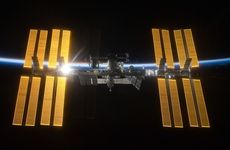
NEW YORK – New research suggests gene expression is altered in immune-related white blood cells from individuals living in space, providing insights into the apparent infection susceptibility that has been described in astronauts on the International Space Station (ISS).
Using pre-flight blood samples from three female and 11 male astronauts, together with four samples apiece collected from the astronauts themselves during their 4.5 to 6.5 months in space on the ISS over a period from 2015 to 2019, the researchers did RNA sequencing-based gene expression profiling on white blood cells.
They then compared transcriptomic patterns within space samples and in relation to white blood cell expression features found at baseline and in samples taken at five time points after the astronauts' return to Earth — work they described in a study published in the journal Frontiers in Immunology on Thursday.
"The experimental design has allowed us to study temporal changes throughout the entire mission up to one-year postflight," senior and corresponding author Odette Laneuville, a biology researcher affiliated with the University of Ottawa and the Ottawa Hospital Research Institute's bone and joint research laboratory, said in an email.
The team's analyses highlighted 276 differentially expressed genes in leukocyte white blood cells from individuals who spent six months in space, including 100 immune-related genes showing reduced expression in space and a restoration of pre-flight expression after astronauts' return to Earth. The work also highlighted a set of more than two dozen genes with enhanced expression on the ISS — a set that encompassed genes with ties to structure or function, molecular regulation, or developmental processes.
"When reaching space, the transcriptomic changes are indicative of decreased immune functions and increased basic cellular activities linked to adaptive changes," the authors reported, adding that their findings "shed light on immune modulation in space" and "the timing of differential expression at transition to and from space" while flagging major adaptive changes in leukocyte activity to adapt to extreme environments.
Together, the gene expression shifts are expected to impact individuals' immune system capabilities in space, the researchers reported. Even so, they noted that the expression of these genes returned to baseline levels after a few weeks back on Earth, on average.
"Many genes related to immune functions rapidly decrease when reaching space and [show the opposite pattern] when returning to Earth after six months aboard the ISS," Laneuville explained, adding that the space-related dip in immune-related gene expression "may explain why astronauts appear more susceptible to infectious diseases while in space."
The findings line up with prior studies documenting the reactivation of latent viruses such as Epstein-Barr virus, herpes simplex 1 virus, or varicella zoster virus in astronauts in space, together with increased shedding of related viral particles in the saliva, urine, or other biological fluids, Laneuville explained. These and other immune-related features point to dampened immunity for those space explorers during their journeys and in the weeks after their return to Earth.
Based on findings from the current study and research reported in the past, the team suggested that the leukocyte cell gene expression changes identified may stem from microgravity effects on blood plasma distribution in the body, which has been shown to dial down blood plasma volume in space.
The investigators noted that additional research will be needed to gauge the actual immune system consequences of the gene expression dynamics detected, and cautioned that astronauts' return to pre-space flight expression may vary somewhat with individuals' age, sex, prior pathogen exposure, and genotype. Likewise, they suggested that more work will be needed to find ways to counteract space-related gene expression changes and potential immune suppression effects in individuals who spend long stretches of time in space.
"A weaker immunity increases the risk of infectious diseases limiting astronauts' ability to perform their very demanding work in space," Laneuville argued. "If an infection or an immune-related condition was to evolve to a severe state requiring medical care, astronauts while in space would have limited access to care and medication."
In a statement, she noted that "[e]arly detection provides opportunities for intervention, with the aim to prevent a progression towards severe symptoms."
